Medal summary
Individual events
| Event | Gold | Silver | Bronze |
|---|---|---|---|
| Dressage | |||
| Dressage individual final | |||
| Eventing | |||
| Jumping | |||
| Jumping Individual Final | |||
| Jumping Individual Speed | |||
| Endurance |
The Equestrian competition at the 2002 Central American and Caribbean Games was held in San Salvador, El Salvador. [1]
| Event | Gold | Silver | Bronze |
|---|---|---|---|
| Dressage | |||
| Dressage individual final | |||
| Eventing | |||
| Jumping | |||
| Jumping Individual Final | |||
| Jumping Individual Speed | |||
| Endurance |
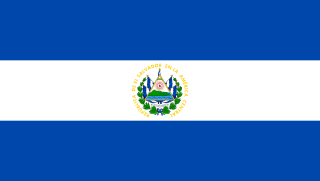
El Salvador, officially the Republic of El Salvador, is a country in Central America. It is bordered on the northeast by Honduras, on the northwest by Guatemala, and on the south by the Pacific Ocean. El Salvador's capital and largest city is San Salvador. The country's population in 2024 was estimated to be 6 million according to a government census.

Salvador Domingo Felipe Jacinto Dalí i Domènech, Marquess of Dalí of Púbol, known as Salvador Dalí, was a Spanish surrealist artist renowned for his technical skill, precise draftsmanship, and the striking and bizarre images in his work.

San Salvador is the capital and the largest city of El Salvador and its eponymous department. It is the country's largest agglomeration, serving as the country's political, cultural, educational and financial center. The municipality of San Salvador has 525,990 inhabitants (2024). The Metropolitan Area of San Salvador, which comprises the capital itself and 13 of its municipalities, has a population of 2,404,097. The urban area of San Salvador has a population of 1,600,000 inhabitants.
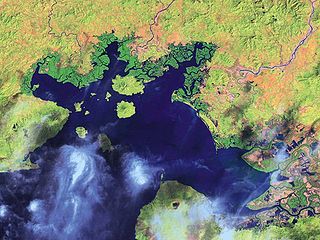
The Gulf of Fonseca, a part of the Pacific Ocean, is a gulf in Central America, bordering El Salvador, Honduras, and Nicaragua.

The El Salvador national football team, known as La Selecta, represents El Salvador in international football, and is governed by the Salvadoran Football Federation (FESFUT).

Henri Salvador was a French Caribbean singer, comedian and cabaret artist.

San Salvador Fútbol Club was a professional football club located in San Salvador, El Salvador that participated in Primera División de Fútbol Profesional from 2002 to 2008.

A pupusa is a thick griddle cake or flatbread from El Salvador and Honduras made with cornmeal or rice flour, similar to the Colombian and Venezuelan arepa. In El Salvador, it has been declared the national dish and has a specific day to celebrate it. It is usually stuffed with one or more ingredients, which may include cheese, chicharrón, squash, or refried beans. It is typically accompanied by curtido and tomato salsa, and is traditionally eaten by hand.
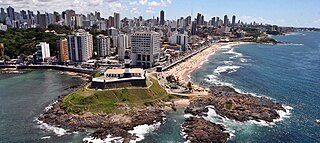
Salvador is a Brazilian municipality and capital city of the state of Bahia. Situated in the Zona da Mata in the Northeast Region of Brazil, Salvador is recognized throughout the country and internationally for its cuisine, music, and architecture. The African influence in many cultural aspects of the city makes it a center of Afro-Brazilian culture. As the first capital of Colonial Brazil, the city is one of the oldest in the Americas. Its foundation in 1549 by Tomé de Sousa took place on account of the implementation of the General Government of Brazil by the Portuguese Empire.
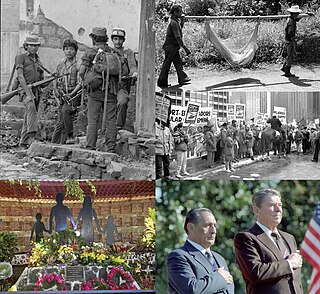
The Salvadoran Civil War was a twelve-year civil war in El Salvador that was fought between the government of El Salvador, backed by the United States, and the Farabundo Martí National Liberation Front (FMLN), a coalition of left-wing guerilla groups backed by the Cuban regime of Fidel Castro as well as the Soviet Union. A coup on 15 October 1979 followed by government killings of anti-coup protesters is widely seen as the start of civil war. The war did not formally end until after the collapse of the Soviet Union, when, on 16 January 1992 the Chapultepec Peace Accords were signed in Mexico City.

The 2002 CONCACAF Women's Gold Cup was the sixth staging of the CONCACAF Women's Gold Cup. It was held in Seattle, Washington, United States and Vancouver, British Columbia, Canada. The winning team, the United States, and runners-up, Canada, qualified for the 2003 FIFA Women's World Cup. The U.S. were later awarded hosting rights to the 2003 tournament, replacing China due to the SARS outbreak. The third-placed Mexico played against Japan in two play-off matches for qualification.
Carlos de los Cobos Martínez is a Mexican former professional football player and manager who last managed El Salvador.

The track and field competition at the 2002 Central American and Caribbean Games was held at the Estadio Nacional Flor Blanca in San Salvador, El Salvador, between 1 and 6 December 2002. Results were reported and discussed in detail on a day-by-day basis.
The Salvador Primera División de Fútbol Profesional Apertura 2002 season started on August 3, 2002.
The association football competition at the 2002 Central American and Caribbean Games was held between 23 November and 7 December 2002, although qualification took place beforehand. El Salvador, the tournament's host, drew with Mexico in the final 1–1, eventually defeating Mexico in a penalty shoot-out 4–3, winning its second title and the first title since 1954.
The Primera División de Fútbol Profesional Clausura 2002 season started on January 20, 2002.
HIV/AIDS in El Salvador has a less than 1 percent prevalence of the adult population reported to be HIV-positive. El Salvador therefore is a low-HIV-prevalence country. The virus remains a significant threat in high-risk communities, such as commercial sex workers (CSWs) and men who have sex with men (MSM).

Estadio Nacional Jorge "El Mágico" González is a football stadium in San Salvador. It is named after Salvadoran star player Mágico González. The stadium has a capacity of 30,000 and was previously known as "Estadio Nacional Flor Blanca", referring to the name of the San Salvador neighborhood where it is located.
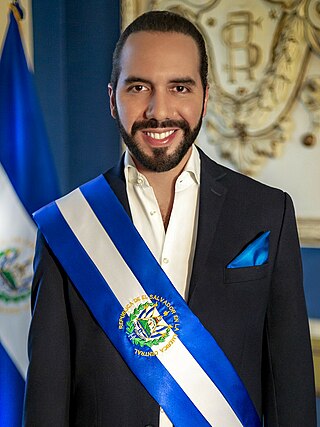
Nayib Armando Bukele Ortez is a Salvadoran politician and businessman who, since 1 June 2019, has been the 81st president of El Salvador. As a member of the Nuevas Ideas political party, Bukele is the first Salvadoran president since 1989 who was not elected as a candidate of one of the country's two major political parties: the right-wing Nationalist Republican Alliance (ARENA) or the left-wing Farabundo Martí National Liberation Front (FMLN), of which Bukele had previously been a member.

From January 1822 to July 1823, the Captaincy General of Guatemala, a former Spanish colony, was controlled by the First Mexican Empire, and briefly, the Supreme Executive Power—the provisional government that succeeded Mexican imperial rule. The captaincy general consisted of the provinces of Chiapas, Costa Rica, El Salvador, Guatemala, Honduras, and Nicaragua—the six southernmost provinces of the Mexican Empire. The incorporation of Central America brought Mexico to the height of its territorial extent.